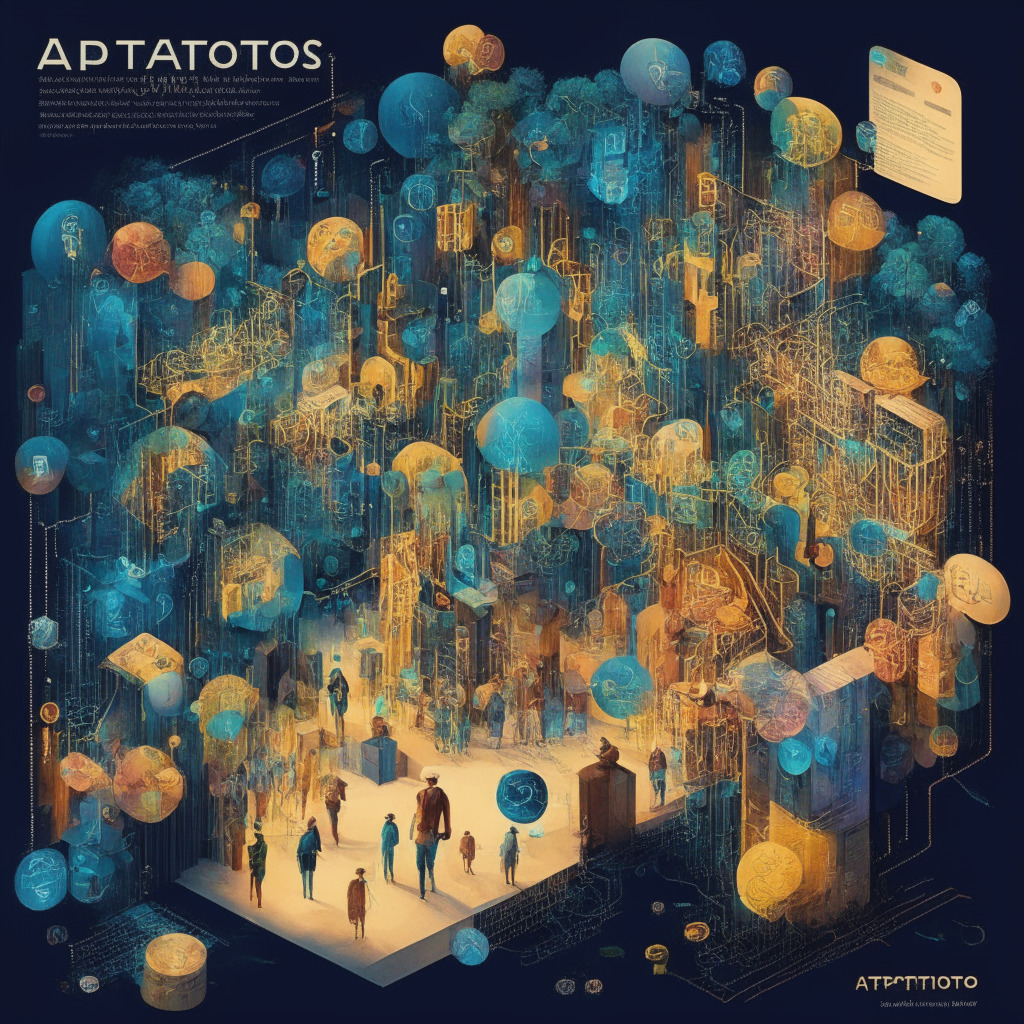“Arbitrum Foundation, a supporter of the Ethereum Layer 2 network, is partnering with Fracton Ventures to tap into the Japanese market. The alliance will focus on ecosystem construction and furnish community education, promoting Arbitrum’s adoption by Japanese developers and investors.”
Search Results for: Mina Foundation
CEO Transition at Near Foundation: A Challenge or Opportunity for Blockchain’s Mainstream Adoption?
Marieke Flament, CEO of the Near Foundation, is stepping down from her role, with no specified reason for her departure. Under her leadership, Near Foundation’s treasury balance has grown to an estimated $350 million. Her tenure saw the onboarding of many web2 players, and fostering of web3 innovators, enabling Near to become the 40th largest crypto by market cap. Her departure leaves questions about the future direction of Near.
Shaking Foundations: China’s Cryptocurrency Dichotomy & Future Implications
“A Chinese court affirms that digital assets, despite their virtual nature, bear economic value and are hence perceived as legal holdings protected by law. This opens questions about China’s policies on public and private cryptocurrencies and the future of digital assets.”
Decentralizing Power? An In-depth Examination of Coinbase’s New Ethereum Layer-2 Protocol
Coinbase’s open-source, permissionless Ethereum layer-2 protocol, Base, is focusing on decentralization and interoperability among varied blockchain chains. The company has designed unique “Base Neutrality Principles” to protect against excessive influence and maintain the merits of decentralization. These principles include not controlling bridged crypto, avoiding transaction favouritism, and not using private data for marketing.
Exploring Lamina1: Creating an Accessible Blockchain Based Metaverse with Carbon Neutrality
“Lamina1, a blockchain dedicated to the metaverse, has revealed its betanet platform for developers and creators. Supported by sci-fi author Neal Stephenson and crypto investor Peter Vessenes, Lamina1 aims for a digital-physical fusion, yet faces skepticism over its user-friendly, secure onboarding process. Their ultimate goal is to advance high-quality content creation, user experience, and carbon-negative infrastructure.”
Illuminati Capital’s Audacious Venture into Blockchain and Web3 Gaming: A Calculated Risk or Folly?
“Dubai’s Illuminati Capital is investing $50 million in early-stage blockchain and Web3 gaming startups. Relying on Blockchain expertise and finance acumen, the venture fund aims to operate as partners, with a unique investment strategy to actively assist companies. However, their foray into the unpredictable world of Web3 gaming presents potential risks and rewards.”
Unraveling Wormhole Foundation’s Galactic Leap: Pros, Cons, and the Future of the Multi-chain Cosmos Ecosystem
“The latest updates from the Wormhole Foundation allow for a seamless interaction between more than 20 disparate blockchains with any application-specific chain within the Cosmos ecosystem. This gateway simplifies migration of tokens onto any Cosmos chain, ultimately aiming to accelerate growth.”
NEAR Foundation & Alibaba Cloud Partnership: Boosting Web 3 Adoption or Harming Decentralization?
The NEAR Foundation has partnered with Alibaba Cloud to facilitate the growth of Web 3 in Asia and the Middle East. This collaboration offers access to Alibaba Cloud’s developer ecosystem, enables launching new NEAR validators, and provides remote procedure calls and multi-chain indexing, fostering adoption and scalability.
BCB-Sutor Bank Deal Termination: Pros, Cons, and Future of Crypto-Banking Relations
BCB Group’s plan to acquire century-old Sutor Bank was terminated due to regulatory delays and market conditions. The company will now focus on its Europe-wide strategy through its e-money license in France, demonstrating the challenges of navigating the evolving relationship between the cryptocurrency and banking sectors amid changing regulations.
Crypto Market Resilience: Price Recovery Amid SEC Allegations and Rising Bitcoin Dominance
Investors in major tokens like Solana, Cardano, and Polygon witnessed price stabilization and recovery after facing significant losses during the weekend’s sudden sell-off. The tokens’ development foundations issued statements countering allegations from the US SEC, boosting investor confidence and contributing to the price recuperation.
GameStop and Telos Foundation Unite: The Future of Web3 Gaming and Risks to Consider
GameStop has announced a strategic partnership with The Telos Foundation to boost its Web3 gaming offerings by integrating Web3 games built on Telos’ robust blockchain network with its upcoming game launchpad, Playr. This collaboration aims to eliminate barriers, making it more accessible for Web2 players to explore Web3 gaming while attracting new users to the emerging ecosystem.
Pony.ai’s Robotaxi Expansion: China’s Race to Autonomous Vehicle Dominance & Its Implications
Chinese autonomous vehicle startup Pony.ai has expanded its driverless robotaxi services with a newly introduced service in Shenzhen. Backed by Toyota Motor and NIO Capital, Pony.ai faces competition from Baidu and Didi Chuxing in the fast-paced Chinese market. The government aims for vehicles with partial self-driving technology to account for 50% of all new-auto sales by 2025.
Ethereum’s Bedrock Hard Fork: Optimism’s Game Changer or Arbitrum’s Continued Dominance?
The Ethereum blockchain will undergo the Bedrock hard fork on June 6 as Optimism, a layer 2 scaling solution, introduces a major upgrade for improved modularity, simplicity, and Ethereum equivalence. This is expected to increase performance and functionality, while fueling positive market sentiment for Optimism’s Layer 2 network.
Offshore Crypto Derivative Platforms: Exploring Gemini Foundation’s Global Reach & Exclusion of Key Markets
Gemini Foundation, an offshore crypto derivatives platform, is now available in 30 countries, excluding the US, UK, and EU. Catering to the demand for crypto derivatives trading, this platform offers a capital-efficient and trusted venue. Regulatory uncertainty and stringent attitudes from authorities like the SEC have driven crypto exchanges to offshore locations.
Aptos Foundation’s $3.5M Blockchain Grants: Boosting Innovation or Execution Concerns?
The Aptos Foundation pledges over $3.5M to 50 project teams dedicated to scaling Aptos blockchain and fostering innovation within the Web3 ecosystem. Grants focus on public good services, infrastructure, and open-source development, covering categories like Developer Tooling, Infrastructure, Education, and Ecosystem initiatives.
Google Cloud Boosts Web3 Startups: A Step Forward to Blockchain Domination or Mere Hype?
Google Cloud recently announced its intention to support Web3 startups and projects in building and […]
Zero-Knowledge Compliance Tools: Balancing Privacy and Regulation in DeFi and Web3
Etonec partners with Mina Foundation to develop a zero-knowledge proof-powered regulatory compliance tool for the DeFi and Web3 markets. This solution will maintain user privacy while addressing KYC and AML regulations, potentially attracting more institutional investors and providing unprecedented data control for users.
Consensus 2023: Web3 Adoption, Corporate Interest, and the Need for Global Integration
Consensus 2023 showcased growing interest in Web3 technology adoption among large companies like Mastercard and Google Cloud. The event focused on essential Web3 strategies, innovations, and privacy, but could benefit from a stronger international presence to understand global opportunities.
OK Group’s Rebranding: Power Consolidation or Crypto Evolution?
The major crypto operator OK Group plans to unite its ventures under the ‘OKX’ brand, signaling a solidified front in the volatile crypto landscape. The move raises concerns around power consolidation, but the group reassures it will maintain existing regulatory frameworks. The phased rebranding approach and commitment to the U.S. as a key operational base add intriguing nuances to this development.
Astrology-themed NFT Scam: Unveiling Blockchain’s Stark Security Challenges
The astrology-themed NFT project, Lucky Star Currency (LSC), has reportedly left with over $1 million, raising serious concerns about the security measures in the blockchain industry. Despite blockchain’s foundational benefits, it’s not invulnerable to manipulative actions, particularly when precautions are ignored. This incident underscores the need for vigilance, research, and due diligence in the crypto space.
CFTC Eyes Former Voyager CEO: Disruption in Crypto Industry or Need for Stronger Regulation?
“The Enforcement Division of the U.S. Commodity Futures Trading Commission (CFTC) may charge ex-CEO of Voyager, Stephen Ehrlich, over a suspected ICO scam. Ehrlich allegedly violated CFTC regulations by not ensuring their customers’ assets’ security. The CFTC is contemplating imposing fines and other non-criminal penalties.”
Assessing Blockchain Impact on Financial Inclusion: Stellar, PwC Framework and Challenging Skepticism
The Stellar Development Foundation and PricewaterhouseCoopers (PwC) have launched a financial inclusion framework to assess the effectiveness of blockchain projects in emerging markets. They found that blockchain-based payments enhance accessibility, reduce transaction costs, and increase transaction speed, notably in financially underserved areas. However, they stress on the importance of responsible design principles and robust governance to mitigate potential challenges and criticism.
Crypto Regulation vs Innovation: DoJ Case & France’s CBDC Vision Unveil the Blockchain Dichotomy
“DoJ asserts that absence of specific US crypto regulation does not invalidate criminal charges against Sam Bankman-Fried, former FTX CEO. Existing laws against misappropriation of customer assets still apply. This situation highlights imbalances in current crypto regulations, where extant laws can yield harsh punitive consequences in new situations.”
Decoding CryptoNight: Champion of Mining Democracy or Falling Giant?
The CryptoNight mining algorithm, a feature of the CryptoNote protocol, aims to prevent the centralization of mining power by allowing CPUs and GPUs to mine blocks. Despite criticisms and ASICs adapting, it remains a successful tool advocating privacy and fairness in mining.
Bitcoin’s Bull and Bear Struggle: Decoding Trends & Future Market Predictions
“Bitcoin’s price may see a potential rise to $27,500 if it can cleanly overcome the $26,700 obstacle. Nonetheless, failure to clear this hurdle may divert Bitcoin to lower levels like $25,400, or $25,000. Keep updated on digital assets and conduct thorough, independent research before investment.”
Crypto Asset Management: A $650 Billion Forecast Amid Regulatory Uncertainty
“Crypto asset management is predicted to grow from a $50 billion valuation to up to $650 billion within five years, based on Bernstein Research’s projections. The hopeful approval of a spot Bitcoin ETF among other catalysts could fuel this growth. Despite regulatory uncertainties, analysts believe essential clarity will eventually prevail.”
Co-founder Conflict Slashes GALA Value & Bitcoin BSC Emerges as Compelling Alternative
The saga of the GALA token includes claims of illicit procurement and misappropriation affecting its price. Amidst this, emerging market sector Bitcoin BSC offers speed, low fees, and reduced environmental footprint. With a staking-based investment strategy promising 8-10% APY and stable pricing, it represents innovation and opportunity in a volatile crypto landscape.
ANZ Joins Hands with Chainlink for a Blockchain Future: The Novelty and Controversy Explored
Australia’s big four bank, ANZ, has successfully conducted a test transaction with Web3 services platform, Chainlink, marking a significant move towards embracing tokenized assets. Utilizing Chainlink’s Cross-Chain Interoperability Protocol (CCIP), ANZ simulates the purchase of a tokenized asset adopting a ‘test-and-learn’ approach.
Ethereum’s Bumpy Journey: From Proof-of-Work to Proof-of-Stake and Beyond
A pivotal upgrade known as the Merge transitioned Ethereum from a proof-of-work (PoW) consensus mechanism to a proof-of-stake (PoS), causing a net supply decrease of 299,922.50 ether. The PoS mechanism needs users to hold ether to validate transactions and earn rewards. This eliminated much miner supply and made Ethereum more eco-friendly. However, despite these changes, ether’s market values have stagnated.
Revamping Ethereum’s Staking Infrastructure: Is SSV.network the Solution to Pool Decentralization and Key Security?
“SSV.network, in partnership with the Ethereum Foundation, recently launched its mainnet aiming to decentralize Ethereum staking pools. Leveraging Distributed Validator Technology, it aims to increase validator resilience, enhance private key security, and minimize the risks of validator downtime.”
Deutsche Bank’s Foray into Crypto: Assured Safety or Regulatory Nightmare?
“Deutsche Bank has partnered with crypto safekeeping specialist, Taurus to establish digital asset custody and tokenization services. They have lodged for a crypto custody license from Germany’s financial regulator, indicative of digital asset custody plans for early 2021. This partnership signals the rising potential of tokenized financial assets.”
The Oscillating Symphony of Cryptocurrency: Prospects, Fluctuations, and Predictions
“In the turbulent crypto market, BTC managed to rise 1.5% amidst recent changes in FTX’s future operations, while other tokens understandably fluctuated. The CoinDesk Market Index oversees trends in hundreds of tokens, providing a reliable insight into market pulse. Uncertainty among traders signals a possible market rebound, yet the market remains restrained due to steadily decreasing BTC performance and other factors.”































